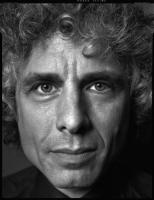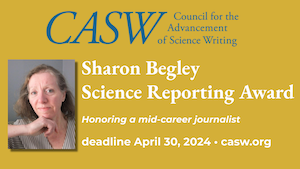By Brendan D. Bane
Birds soar, cheetahs sprint, and humans speak. Just as each animal’s unique behavior evolved via natural selection, our capacity for language is also hard-wired in genes and brain tissue.
That’s the conclusion announced by Harvard University psychologist Steven Pinker on February 15 at the American Association for the Advancement of Science meeting in Boston. His fellow panelists provided new evidence supporting the notion that people may learn languages, but their ability to learn them is innate.
Pinker argued that by exploiting the “cognitive niche,” our early ancestors unleashed a suite of traits that set the stage for language. An opportunistic diet, group living, and walking upright were all qualities that led to enhanced intelligence and, eventually, the capacity to use language.
Once we were able “to overtake other organisms’ fixed defenses by using mental models of the world,” said Pinker, “that allowed us to engage in cause-and-effect reasoning.” That kind of intelligence may have given way to our unique brand of communication.
Biologists and linguists have long debated the evolutionary history of language. Members of both disciplines have speculated that there are no language genes, per se, and that no such genes could be targeted by natural selection.
But Pinker argued otherwise, suggesting that some genes are strongly associated with speech and bear the fingerprints of selection: They popped up in our genetic history and were conserved.
The FOXP2 gene, which affects human speech and facial control, is one such gene. It influences more than just vocalization, but Pinker believes it became part of our genome because of its role in language.
People who have mutated forms of FOXP2 are unable to articulate or control their speech organs (lips, tongue, and jaw). Brain scans show that mutations in FOXP2 are coupled with lower than normal activity in certain areas of the brain.
Scientists have long known that specific areas in the brain regulate language. When those areas become damaged, speakers suffer any number of aphasias (speech deficits), and researchers infer a connection.
Researchers explore the brain-language relationship using not only human brains, but bird brains as well, explained neurobiologist Erich Jarvis of Duke University. His work focuses on vocal learning in songbirds, parrots, and hummingbirds.
“For songbirds,” Jarvis said, “we call it song. For humans, we call it speech. Neurobiologically, they’re all using the same brain circuits.”
Jarvis found seven brain structures that were similar across all three bird groups. He also found that those same areas were similar in human brains. Just as humans have aphasia, songbirds have song-aphasia.
Although analogies between human and bird brains are sometimes contested, Jarvis explained that brain areas associated with language are in similar places in both bird and human embryos.
Another tenet of Pinker’s argument was children’s seemingly innate capacity for language. If they grow up without a language to learn, they’ll usually invent one. As even Charles Darwin noted, “Man has an instinctive tendency to speak, as we see in the babble of our young children; whilst no child has an instinctive tendency to brew, bake, or write.”
Indeed, babies sometimes develop preferences for their native tongue in utero, said cognitive scientist Janet Werker of the University of British Columbia. Her research showed that when premature babies are spoken to in native and foreign languages, they preferred their parents’ language.
“Acquisition of a native language begins very early,” said Werker. “However, it requires biological preparedness.”
Brendan Bane is a senior at the University of California, Santa Cruz, where he studies ecology and evolutionary biology. He writes for the University of California’s student newspaper, TWANAS, and blogs at sciencebane.wordpress.com. Reach him at brendanbane@me.com.

.png)

